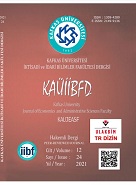THE IMPACT OF INTERNATIONAL ENERGY PRICES ON WORLD TRADE: PANEL EVIDENCE OF GRAVITY MODELS FOR SELECTED COUNTRIES
THE IMPACT OF INTERNATIONAL ENERGY PRICES ON WORLD TRADE: PANEL EVIDENCE OF GRAVITY MODELS FOR SELECTED COUNTRIES
Author(s): Memduh Alper Demir, Utku UtkuluSubject(s): Supranational / Global Economy, Energy and Environmental Studies, International relations/trade, Evaluation research
Published by: Kafkas Üniversitesi Sağlık, Kültür ve Spor Daire Başkanlığı Dijital Baskı Merkezi
Keywords: World trade; energy prices; gravity models of bilateral trade; panel random effects; fixed effects filtered and stochastic frontier estimation methods;
Summary/Abstract: The aim of this article is to examine the impacts of prices of energy and non-energy goods on world trade by including some variables that affect trade for selected countries within the framework of relative prices. The relevant literature confirms that the bilateral trade is theoretically analyzed by using the gravity models. The theoretical gravity models can be empirically applied by using the various panel regression techniques. In this study, three types of panel regression techniques are employed to define the effects of independent variables in the case of trade as the dependent variable. These are Stochastic Frontier, Random Effects, and Fixed Effects Filtered Estimator techniques. According to our panel regression findings, the price increases in the index of energy goods have negative effects on the exports, resulting in the terms of trade being against the countries in this case. Findings suggest that socio- economic policies preventing energy prices from rising need to be developed. Raising the supply to meet the increasing demand could be one of the major policies. Considering the other variables in the model, empirical evidence suggests that world trade volume can be increased not only by strengthening growth policies, ensuring competitiveness in the market, and providing effective logistics management but also by ensuring cultural cooperation, developing business partnerships among the similar income-level countries, and increasing and/or diversifying energy supply.
Journal: Kafkas Üniversitesi İktisadi ve İdari Bilimler Fakültesi Dergisi
- Issue Year: 12/2021
- Issue No: 24
- Page Range: 946-974
- Page Count: 29
- Language: English

